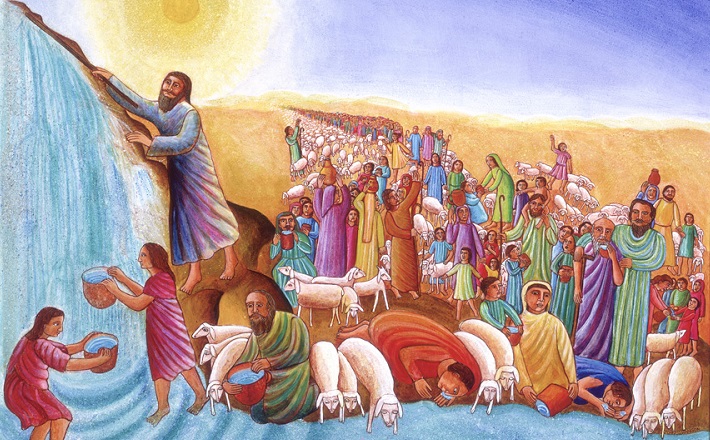Commentary on Ephesians 1:1-14
This 4-week Narrative Lectionary preaching series on Ephesians does not actually include what are probably the letter’s best-known verses, though one imagines it might not be difficult to find at least one occasion during a month of sermons to cite them!
They offer the content of the letter in miniature:
For by grace you have been saved through faith, and this is not your own doing; it is the gift of God — not the result of works, so that no one may boast. For we are what he has made us, created in Christ Jesus for good works, which God prepared beforehand to be our way of life (Eph. 2:8-10).
Notice the emphasis on grace, on creation and redemption as of a single piece, on good works as a way of life, and on God’s planning of all these things before any of the recipients of grace came on the scene. These themes surface again and again in the letter. The four readings for the month tell this story:
- Ephesians 1:1-14 — God was planning something big before we knew it.
- Ephesians 2:1-22 — The plan of God was necessary because of the estrangement humanity knew from God and one another, divisions broken down by Christ.
- Ephesians 4:1-16 — The plan of God has implications not just for past estrangement but present and future growing up into Christ.
- Ephesians 6:10-20 — In the present, God continues to make provision for us in the still-contested arena of human life.
Introductory Matters
Ephesians includes Paul’s name, and while its actual authorship is disputed, it is clear that whoever wrote the letter intended to write within the Pauline tradition. The words, “in Ephesus” are missing in significant early manuscripts, leading to speculation that the letter was originally a general letter, or that it was addressed to a less well-known area of Pauline missionary activity and only later came to be associated with Ephesus. Most commentaries offer a full discussion of the authorship and addressee questions. Andrew Lincoln’s work in the Word Biblical Commentary series is especially helpful on these and other issues, and it also offers excellent insights for preaching and teaching the letter.
Week 1 (July 16, 2017)
Preaching text: Ephesians 1:1-14; accompanying text: John 14:25-27
The letter begins with a blessing for God rather than a thanksgiving for the Ephesians themselves. The theological and Christological emphases will continue throughout, yet it does not take much imagination to see the implications of God’s work for those to whom the letter is addressed. They have been adopted as children of God.
“But wait,” as the infomercials always say, “There’s more!” Readers are insiders to a much bigger plan than even the lavish grace that forgives our sins and buys us back from all that would seek to own us. God intends to gather all things up into Christ, so that the love, healing, wisdom, and welcome that we associate with Jesus will be the way the whole creation works. This is our destiny and that of the whole creation: to “live for the praise of his glory.”
Week 2 (July 23, 2017)
Preaching text: Ephesians 2:11-22; accompanying text: Matthew 28:16-20
Think of the perennial hot spots around the globe, or the places of enduring tribal violence, or the generation-to-generation legacy of racial tension in the United States. Then read Ephesians 2:14, “He is our peace.” We often speak of Christ creating peace between humanity and God, but in this reading, the peace that Christ brings is between one group of human beings and another as much as it is related to humanity’s standing before God. Hostility between us is overcome (v. 14) and reconciliation with God is also made real (v. 16).
From people on the opposite side of culture wars, to that nemesis at work or the bully at school, most of us have an enemy who is not entirely an abstraction. Many of us may also be “the enemy” of someone else. As a way of making horizontal reconciliation vivid, we might try praying for enemies as part of the worship service where this text is preached. How big, or different from what we know, would the household of God have to be to hold us all together?
Week 3 (July 30, 2017)
Preaching text: Ephesians 4:1-16; accompanying text: John 15:1-4
Ephesians is ostensibly written by an imprisoned apostle Paul, and here the prisoner in the Lord implores his readers to live worthily of their calling to life without dividing walls or prison bars. The center of the text, however, is not an imperative, but the story of Christ’s astonishing freedom and willingness to descend to earth with the gifts of heaven. We know this plot line from Philippians 2. He did not count equality with God a thing to be grasped. He emptied himself.
Commentators disagree on the order of the descent and ascent described, yet finally, it matters little whether the descent in Ephesians 4 is the pre-incarnation descent of Christ from a place of privilege in the heavens, or what we know better as the post-resurrection descent of the Spirit of Christ with gifts for the church. Either way, heaven and earth, divine and human are not so tidily divided as we imagined, and they never will be again. Christ has bridged the distance, giving gifts so that we might all grow up into him.
Week 4 (Aug. 6, 2017)
Preaching text: Ephesians 6:10-20; accompanying text: Matthew 10:28-31
In his commentary on Ephesians, Andrew Lincoln speaks approvingly of “popular expositions, which summarize the message of the letter in terms of three verbs, ‘sit,’ ‘walk,’ and ‘stand’” (Word Biblical Commentary [Dallas: Word Books, 1990] vol. 42, p. 460). Believers have been raised up and seated with Christ in the heavenly places (1:20; 2:6). We are therefore to walk in a way that is worthy of the gospel (4:1), and we receive that we need to stand against the wiles of the devil (6:11, 13).
The last reading in our series gives voice to our sense that many of the problems our neighborhood, our world, and we ourselves face are beyond our capacity just to roll up our sleeves and muscle our way to a solution. Throughout Paul’s letters, sin is a power rather than a type of human action, and Ephesians continues this idea: “Our battle is not against enemies of blood and flesh…” (6:12). Christian life, individually or collectively, means persevering in the still-contested arena of human life, standing when we would prefer to fold, or fight, or flee.
Old Testament prophets used the same armor metaphor to speak of how God would defend against injustice and evil (see, for example, Isaiah 59:15-17). In Ephesians, God’s own armor is available to believers; we have God’s own protection as we stand against the “powers of this present darkness” (6:12). The armor pieces are all defensive, with the exception of the side arm “sword of the Spirit, which is the word of God” (6:17).
Finally, the imprisoned apostle asks for prayer that he, an “ambassador in chains,” may speak freely. The mixed metaphor paints precisely the picture we have of Paul at the end of Acts. There he is under arrest, yet he is also “proclaiming the kingdom of God and teaching about the Lord Jesus Christ with all boldness and without hindrance” (Acts 28:30). As we follow Christ, the prayer for free and bold speech, whatever the circumstances, is ours as well.


July 16, 2017